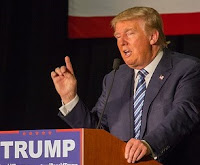A
Tweet on Twitter doesn’t often hit me like a splash of ice water in the
face.
This one did:
“You
can be a conservative or a liberal and be a follower of Christ, but it is not
possible to be a follower of Trump and a follower of Christ.”
Let
that sink in. Do I have your attention
yet?
Before
you speculate on who made the unsettling comment, let me point out that it was
uttered by a celebrated theologian whom I and many thousands of others admire
and respect. I’ll reveal who it is in a
moment.
You’re
probably aware that according to several post-election surveys, more than 80%
of mostly white “evangelical Christians” did, in fact, vote for Donald Trump –
effectively handing him the Presidency.
Evidently, evangelicals,
by and large, gave Trump a complete pass on his sometimes foul and culturally-divisive
use of language, his anti-immigration insinuations, his misogynistic tales on
video, his castigation of the media and his negatively targeted comments toward
specific races and at least one world religion. This is not an insignificant
muster.
What
could be the dynamics of this apparent blurred vision between evangelicals and
mainline Christians?
Let me be clear right
off; I am NOT making the judgmental inference that 80% of evangelicals are not
followers of Christ. What I AM
suggesting is that we – all voters who call ourselves Christians – perhaps
should re-examine some of the considerations which led to our vote choice.
Also let me state that
one of the most commonly heard reasons given among evangelicals for casting a
ballot for Donald Trump – they said it was simply making an obvious choice
between “the lesser of two evils” – is to me at best a cop-out and at worst a distressing
misinterpretation of the Christian faith.
So, who made the quote
at the beginning of this post?
The author is none
other than the esteemed Miroslav Volf, Yale Divinity School professor of systematic
theology and founder and director of the Yale Center for Faith and
culture. One probably couldn’t find a
more qualified theologian for authenticity and reliability regarding an issue
like this.
What, then, did Volf
mean to accomplish with his Tweet?
To get some
perspective, we can look to a couple of Volf’s subsequent Tweets. In them, he
suggests that it would be a mistake to conclude that Christ followers only need
be concerned with things regarding the state of the human soul. Rather, he submits, most theologians agree
that Christ’s kingdom is “unmistakably political” as well. He cites Karl Barth’s writings of Nazi
resistance as but one example.
Those Christians who
look at Trump and perceive him as a “political savior” are most likely focusing
on the wrong person, he suggested.
“Those who do see him
as a ‘political savior’ therefore ‘follow him;’ they are committed to him and
his vision. That’s not the stance a
Christian should have toward *any* politician.
But whether one ‘follows’ Trump in this sense or merely ‘supports’ his
character and political vision, one is still on a collision course with our
Lord Jesus Christ,” he Tweeted.
Volf believes that the
goal of the history of God with humanity is ultimately a “polis” – a New
Jerusalem – and that Christ, the incarnate Word, is the measure of politics just
as He is the measure of all things.
“If Christ is the
measure of politics, then every person who aspires to follow Christ has to be
able to show how the political vision he or she espouses can be justified by
appealing to Christ’s life and teaching, or, at the very least, make an
argument that it does not collide with the life and teachings of Christ,” he explained
via Twitter.
He continues rather
pointedly, “Most of what was important to Jesus is openly despised by Trump, and
most of what is important to Trump was condemned by Jesus.”
He admits some would
see things differently, but for the future he envisages the desired touchstone as
being “to strive to align our political vision with the vision of Christ’s
kingdom.”
One
of our sons, Gregg, is a senior pastor in Newberg, Oregon at Newberg Friends
Church. In a sermon this past May, he
dealt with virtually this same dilemma but in another context. Here is an excerpt of what he said last Palm
Sunday:
“My question had always been, ‘What works in this world we live in?’ When
NOTHING works, a new question is raised. Rather than what works, the question
becomes: ‘What choices most reflect and exemplify the character of God?’
“Did Jesus just open a gate for us, or is Jesus the gate we walk through,
and is he the one who shapes our lives? Was Jesus unique in his mission to
bring salvation, or is his life (also) a model for our attitudes and actions?”
Gregg, in essence, comes to virtually the same conclusive inquiry as does Miroslav
Volf (coincidentally Gregg’s favorite prof in Seminary many years ago). It’s the same query we all need to make: Are our personal life and political vision aligned
with that of Christ’s kingdom?
Our savior, both politically and soul-wise, is Jesus Christ. Wouldn’t it be wiser to align ourselves with
His life and teachings first? Then if
that benchmark permits support for the President-elect on some issues, well and
good. But so far, in the opinions of
many of us, such issues have been scant.
Additionally, Trump has given indications that he is moving toward a
stronger nationalistic, more militaristic and an increasingly monetarist Presidency,
seemingly in resonance with his constituent voters.
Regrettably, not one of these objectives carries any status in Christ’s
kingdom.
By the way, click here to find Gregg’s entire sermon (with visuals).
* * *
NOTE:
This post is the first after a long, self-imposed respite. We hope to change that in 2017.







